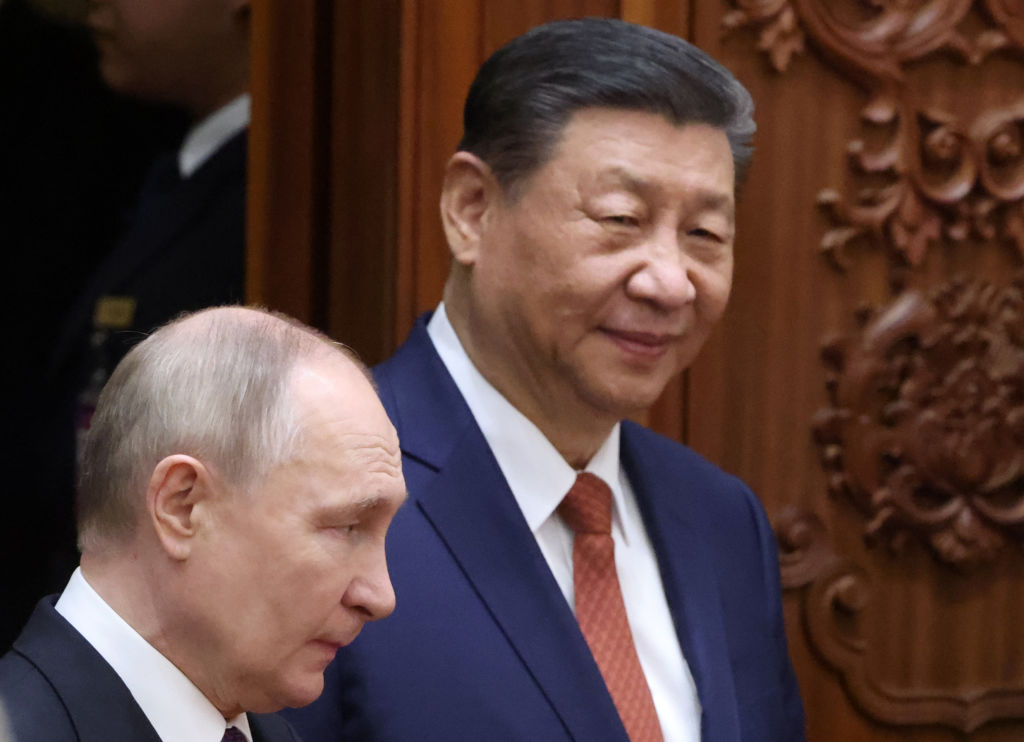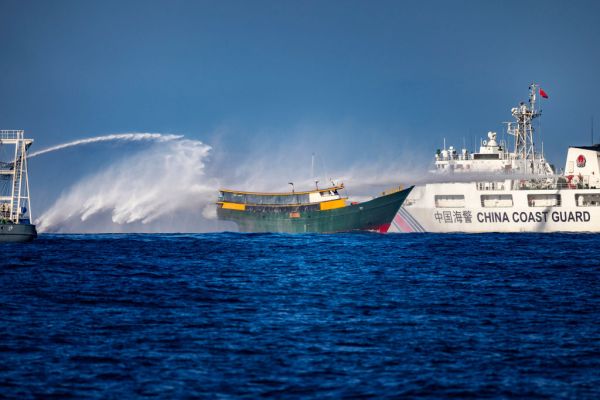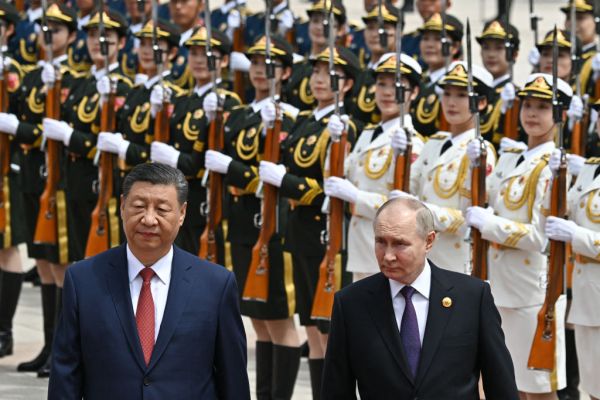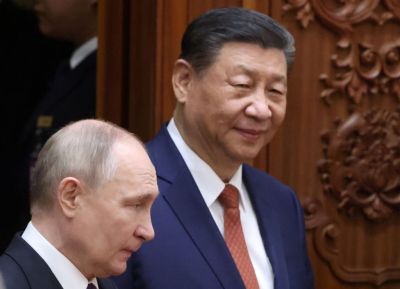In 2017, President Donald Trump’s first administration published a historic National Security Strategy, which rightly stated that we had entered a new era of great power competition with China and Russia. The strategy warned that China and Russia were “revisionist” autocratic powers that sought “to shape a world antithetical to U.S. values and interests.” Soon thereafter, many analysts began to refer to our current era as Cold War 2.0. While I have some reservations about this metaphor—superimposing the old Cold War framework onto contemporary great power competition distorts more than it explains—there is no question that a superpower rivalry between the United States and the People’s Republic of China (PRC) will be the defining feature of international politics in the 21st century.
Eight years later, Trump and his team are still clear about the risks of China’s growing influence—Secretary of State Marco Rubio said as much in Panama on Sunday—so I presume they still see the China threat as outlined in 2017. But his second administration’s actions are inconsistent with that assessment, with many of its initial foreign policy decisions—whether intentionally or inadvertently—directly damaging the United States’ ability to compete with its top geopolitical rival.
During the original Cold War, for example, America’s powerful and loyal allies in Europe, Asia, and the Middle East were our greatest comparative advantage over the Soviet Union, which had only weak partners who had to be coerced into participating in the Warsaw Pact and other security relationships. In our new era of great power competition, allies will again prove essential to success.
Trump does not appear to agree. Even before he was sworn into office, he sparked a significant conflict with one of our closest, loyal, and enduring allies—Canada—by mocking our northern neighbor as the 51st state. Earlier this week, he made plans to impose 25 percent tariffs on most Canadian goods without a coherent explanation—before granting the country an extra 30 days just hours before the levies were set to go into effect. Trump also triggered a significant rift with another NATO ally—Denmark—by outlining his designs on Greenland, either through a sale or even by force. (Polls clearly show that the residents of Greenland have no interest whatsoever in joining the United States.) Weakening ties with our allies only helps China and Russia. We will not be able to win Cold War 2.0 on our own.
During the last Cold War, the U.S. competed for influence with the Soviet Union throughout the developing world. Although we suffered many setbacks—including, most tragically, in Vietnam—we eventually prevailed in this dimension of competition because we offered better trade and investment opportunities and provided more effective foreign assistance.
Based on the first weeks of his second term, Trump does not seem to care about forging closer ties with developing nations. He bullied Colombia into accepting military planes carrying illegal immigrants, embarrassing the Latin American country’s democratically elected president. He has threatened to take back the Panama Canal—even dispatching his secretary of state to the nation for his first overseas trip—and threatened to impose massive tariffs on Mexico, which compelled our southern neighbor to deploy 10,000 soldiers along the border in return for suspending these tariffs for a month. The White House also attempted to freeze all foreign assistance, and appears to be dead-set on shutting down the U.S. Agency for International Development (USAID)—which President John F. Kennedy created to execute the Foreign Assistance Act of 1961 and help us compete more effectively with the Soviets. All these actions create tremendous opportunities for the PRC. Chinese President Xi Jinping is not shutting down his country’s foreign assistance; he is offering aid, trade, and investment instead.
During the Cold War, the United States anchored a set of multilateral institutions that supported global capitalism: the World Bank, the International Monetary Fund, and the General Agreement on Trade and Tariffs (GATT), which later became the World Trade Organization. We also negotiated bilateral and multilateral trade agreements, animated by the idea that shared rules, norms, and laws could facilitate commerce between market economies, making everyone better off. It worked. During the Cold War, the capitalist world prospered; the communist world did not.
Today, Trump seems eager to disrupt or even destroy these organizations, believing the United States is better off acting alone. In threatening to impose tariffs against Canada and Mexico a few days ago, he violated a trade agreement—the United States-Mexico-Canada Agreement (USMCA)—that he himself negotiated during his first term in office. China is doing just the opposite, actively participating in the multilateral economic clubs we created and seeking to reform them to better reflect Chinese interests. The PRC is also inventing all sorts of new organizations—the Belt and Road Initiative (BRI), Asian Infrastructure Investment Bank (AIIB), the Shanghai Cooperation Organization (SCO), the Regional Comprehensive Economic Partnership (RCEP), BRICS, etc.—to tie together a global economic system anchored by Beijing. We cannot compete with Xi’s strategy if we do not even try.
The United States’ significant and strategic investments in national defense also contributed to our victory in the last Cold War. Deterrence with the Soviets worked because we maintained a robust, technologically sophisticated military.
I’m cautiously optimistic that Trump and his team continue to see the value of a strong military, with the president correctly arguing for years that we and our allies must spend more on defense. But we must do so prudently and effectively—and his recent proposal to build an “Iron Dome” to protect the United States from missile attacks is the opposite of that. We need more ships, missiles, and autonomous vehicles deployed in Asia. We need more NATO soldiers and equipment along the border with Russia in Europe. We need to integrate artificial intelligence more quickly within the Pentagon to make procurement more efficient. We do not need to waste resources on building a two trillion-dollar space shield that is unlikely to work.
Even setting aside alliances, foreign aid, global trade, and military might, it is our democratic ideals that constitute one of our greatest advantages in competing with China in the 21st century, with polls from around the world finding that most people prefer democracy to dictatorship. American presidents worked with Congress to create Radio Free Europe, Voice of America, the U.S. Information Agency, the National Endowment for Democracy (NED), and the aforementioned USAID to help us win that ideological struggle. We won the ideological competition with communism because most of the world agreed that freedom is better than tyranny and democracy is better than dictatorship.
Trump has signaled little to no interest in advancing democracy abroad. Elon Musk, arguably Trump’s closest adviser, has inaccurately described NED as a scam, music to the ears of dictators in China, Russia, Iran, North Korea, Venezuela, Cuba, and Nicaragua. In these countries and many others over the last four decades, NED has provided small grants of direct assistance to human rights activists, independent journalists, democratic leaders, and rule of law champions, including to exiled communities. Shutting down American organizations like USAID and NED that support democracy, markets, and the rule of law helps the Chinese and their autocratic allies and hurts our democratic allies and partners. It’s that simple.
During the Cold War, Republicans and Democrats generally agreed on the need to support freedom and contain communism. The term containment was elastic—used to describe détente with the Soviet Union as well a communist rollback—and our society was deeply divided at times over how to achieve it, particularly during the Vietnam War. However, the bipartisan commitment to the common cause of defending capitalism and democracy and prevailing over the Soviet Union helped us win the Cold War.
Today, Trump is fomenting deep divisions within the U.S. government and U.S. society as a whole, another gift to China. As George Kennan warned in 1947, “exhibitions of indecision, disunity and internal disintegration within this country have an exhilarating effect on the whole Communist movement.” Sound familiar? We will not prevail against China if we spend all our time fighting each other at home. We will not win Cold War 2.0 if we destroy our national security state. We will not win if we purge talented and experienced national security experts from our government.
The good news is that we are only entering the third week of Trump’s second term, so there is still plenty of time to correct some of these initial mistakes. But if we are going to prevail against China and its junior partner, Russia, we must get serious about devising a grand strategy. Alienating our allies, cutting aid, disrupting trade, abandoning our values, and fighting among ourselves is not that.






Please note that we at The Dispatch hold ourselves, our work, and our commenters to a higher standard than other places on the internet. We welcome comments that foster genuine debate or discussion—including comments critical of us or our work—but responses that include ad hominem attacks on fellow Dispatch members or are intended to stoke fear and anger may be moderated.
With your membership, you only have the ability to comment on The Morning Dispatch articles. Consider upgrading to join the conversation everywhere.